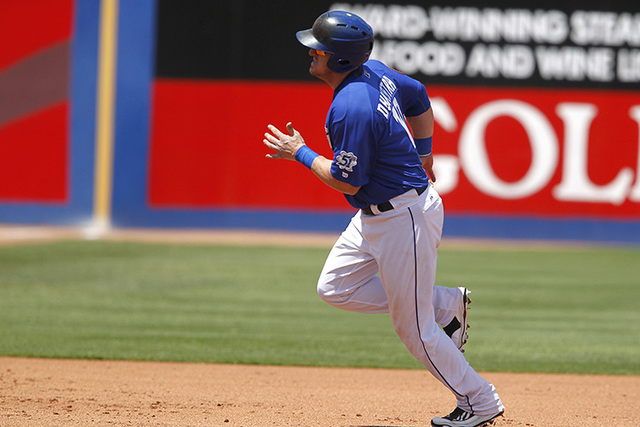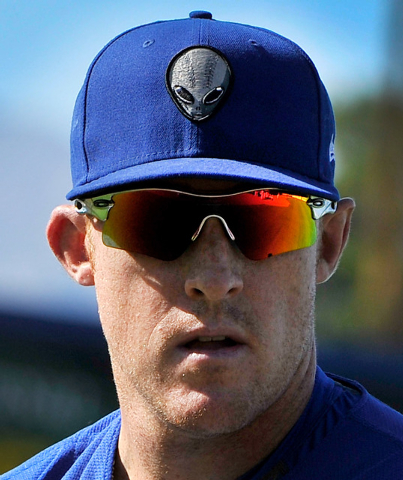Minor leaguers deal with need for additional work


On the cusp of the big leagues, 51s relief pitcher Chasen Bradford still lives at home with his mother and worked three jobs last offseason to supplement his meager minor league salary — which is below the U.S. poverty line of $11,670.
To save money, the Silverado High School and College of Southern Nevada product shared a two-bedroom apartment with six players when he was at Single-A Savannah, where the Sand Gnats took 16-hour bus rides to some games.
“It was the longest bus ride of my life,” said Bradford, 25.
Life might be glamorous in the majors — where the minimum salary is $500,000 and the average salary is almost $4 million — but in the minors it’s anything but.
“It’s a grind. That’s for sure,” said Bradford, a fourth-year pro.
Several other players in the Las Vegas clubhouse also described life in the minors as “a grind.”
“People think it’s all fun and the lavish lifestyle, and it’s the total opposite,” said outfielder Cory Vaughn, a fifth-year pro.
Unless a player receives a lucrative signing bonus to live on after getting drafted or becomes a minor league free agent (after seven seasons), he will have to make ends meet in the minors on a maximum monthly salary of $1,100 in his first year that increases to $2,150 a month in Triple A.
For the five-month season, that’s only $10,750, which is well below the wage earned by the average fast-food worker in a year. Take out taxes, money for lodging and clubhouse dues ($450 a month), and there isn’t much left.
“I don’t know how people did it without getting a substantial signing bonus,” said first baseman Allan Dykstra, a 2008 first-round draft pick of the San Diego Padres who received a $1.15 million bonus. “It’s something I have to use all the time. I can’t afford just living with the salary I make.
“I’m obviously more fortunate than others with the signing bonus I had. I don’t really have to scrap to get by, but that’s a low percentage of people.”
The average signing bonus is about $2,500, according to a class-action lawsuit filed in February against Major League Baseball — which handles minor league contracts — that alleges violations of wage and overtime laws.
“No one is saying that minor leaguers should be getting rich,” said Garrett Broshuis, a former minor leaguer-turned-attorney who helped build the case, which will be heard in September in San Francisco. “But if McDonald’s and Wal-Mart can pay a minimum wage, then Major League Baseball can, too.”
According to the complaint, while big-league salaries have risen by more than 2,000 percent since 1976, minor league salaries have increased by just 75 percent during that time.
51s manager Wally Backman said he made $500 a month in his first year in Single A in 1977, and pitching coach Frank Viola made $600 a month in his first year in Double A in 1981. Likewise, three decades later, Las Vegas utilityman Anthony Seratelli made $700 a month in his first season in rookie ball in 2007.
“For a young kid, nobody understands how tough it is to survive on the money you make in the minor leagues,” Viola said. “In this day and age, there’s no way in hell you can survive.”
As an undrafted player out of Seton Hall, Seratelli never received a signing bonus and got only the standard minor league salary for his first seven seasons before finally receiving a substantial raise this year as a minor league free agent.
“I’m making way more than I made in any other year,” he said. “In the seven years I played, I never made more than $12,000 a year.”
Seratelli said minor league free agents typically make $5,000 to $20,000 a month, and players with big-league experience can make more.
With the exception of a $25 per diem each Sunday, minor leaguers aren’t paid in spring training. During the regular season, they receive a $25 per diem for road games only.
While most games start at 7:05 p.m., players are typically at the park from around 2 p.m. to 11 p.m. and work an average of 60 to 70 hours a week, not including travel.
“It comes out to around two dollars an hour,” said Seratelli, who believes minor league players deserve more money.
“Twelve thousand dollars a year, at most. You can’t live off that,” he said. “I think it should be raised. It seems like it could be. There’s so much money in the big leagues, I feel they could dispense a little bit. But it’s not gonna happen.”
Viola agrees minor leaguers should make more money.
“Absolutely,” he said. “There’s a lot of money in baseball. I think the (MLB) players’ union should really take a look and work with the owners, as far as helping out the minor-leaguers down the line.
“A lot of these kids walk away from the game because they don’t have enough money, and that’s a shame. They’re probably making less than minimum wage when you break it all down.”
Which is why most 51s players have or have had offseason jobs. Brandon Allen worked at a sporting goods store early in his career, and Giancarlo Alvarado had a job bagging groceries in his native Puerto Rico. Seratelli was a substitute teacher, Vaughn had a job at UPS, and Bradford worked at Best Buy — after giving pitching lessons and coaching a 12-year-old travel team.
“It was a 12-hour day every day, and then finding time to work out and throw, it’s taxing. But those are the sacrifices you make to chase the dream,” said Bradford, who signed with the Mets for $1,000 as a 35th-round draft pick out of Central Florida. “It’s worth it. If it doesn’t happen, it doesn’t happen. But I’m gonna give it my best shot.”
This offseason, Bradford plans to play in the Puerto Rican winter league, where he can make about $5,000 or $6,000 a month. Dykstra plans to return to the Venezuelan winter league, where the pay is $10,000 to $15,000 a month.
“I’ll make more money in a month than I did all season,” Dykstra said.
If all else fails, Dykstra always could consider another offseason option.
“We were joking around that I could actually file for unemployment in the offseason because I don’t make enough money during the year,” he said, laughing. “I’d probably get paid just as much or more.”
For now, it’s back to the grind.
“It’s not all peaches and cream,” said Allen, an 11-year veteran. “It’s not much money, but that’s what you sign up for. For the most part, guys love what they do. We play a game for a living. You can’t beat that.”
Contact reporter Todd Dewey at tdewey@reviewjournal.com or 702-383-0354. Follow him on Twitter: @tdewey33.












